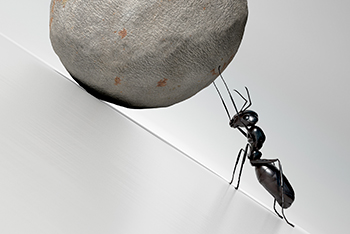 During my second year practicing law, I was asked by a partner to do a commercial-lease review. I had a few lease reviews under my belt at that point, and the feedback I had received had been good. My mentor at the time was good friends with this partner and offered to help me, because “this partner is very particular about the way he wants his leases reviewed.” I told my mentor that I had an extensive conversation with the partner, and I felt confident reviewing the lease on my own.
During my second year practicing law, I was asked by a partner to do a commercial-lease review. I had a few lease reviews under my belt at that point, and the feedback I had received had been good. My mentor at the time was good friends with this partner and offered to help me, because “this partner is very particular about the way he wants his leases reviewed.” I told my mentor that I had an extensive conversation with the partner, and I felt confident reviewing the lease on my own.
I finished the project and turned it into the partner, and a few weeks passed. One day, I noticed the partner walking down the hallway with the lease file under his arm. He passed my office and went straight into my mentor’s office (which was right next to mine) and shut the door. Try as I might, I couldn’t hear a word of their discussion, but I knew it wasn’t good. As it turned out, I had failed on a few levels to capture what this partner wanted in the lease review. My mentor took me aside, went through the lease step by step, and helped me get back on track. I turned in the project again, and it was a success.
My mentor gave me a great gift that day. He let me sit with and process the embarrassment, anxiety, and other emotions I was feeling. Then he encouraged me to try again. He didn’t shame me or make me feel like this one mistake would cost me my job. He let me learn from my failure and that gave me confidence, which I needed at many other points in my law practice.
What is Grit?
Ways to Develop Grit
The following techniques might help you develop the passion and the perseverance necessary to reach long-term goals:
- Learn to handle failure. It’s inevitable and your ability to get past it is crucial to success.
- Develop a growth mindset. Praise effort and process rather than
intelligence.
- Talk about grit. Share examples with other lawyers.
- Practice deliberately. To become an expert, focus on every nuance of your area.
Succeeding as an associate attorney was an important goal of mine, and the lease-review failure was just one of many obstacles I faced. Obstacles and roadblocks are going to happen during the process of achieving any challenging, long-term goal, but what matters is how (or whether) you persevere. Having both the passion and the perseverance to achieve your long-term goals is called grit. Grit is often associated with other constructs such as hardiness, resilience, ambition, and need for achievement, but what differentiates grit from these other concepts is that for it to exist, two elements must be present: zest/passion and persistence of effort.1
Grit and Success
Grit is also an important predictor of success. Gritty students tend to outperform their less gritty peers, and grit scores are associated with higher GPAs.2 In one study, grit was a more accurate predictor of whether an incoming cadet would finish his or her first summer of basic training at West Point; more so, in fact, than self-control, GPA, military performance score, and West Point’s own whole candidate score.3 Grit also predicted which students would advance into later rounds of the Scripps National Spelling Bee.4
More recently, grit has been shown to predict the success of women lawyers in the AmLaw 200.5 Specifically, a lawyer’s level of grittiness influenced how she received the message given to her at her performance review, the number of hours worked, and her own perception of the quality of work she was assigned.6 This is a big finding in the legal profession because for years, men and women have been entering law schools and law firms as first-year associates in roughly equal numbers, yet the number of women making it to the highest levels of partnership has remained static – and really low. As of 2013, the number of female equity partners was about 17 percent. Also troubling is that the percentages of women equity partners and women associates in the typical law firm have actually declined slightly in the past two years.7 Encouraged by this research from the professional development executive Dr. Milana Hogan, the American Bar Association Commission on Women in the Profession created the Grit Project to educate women lawyers about the science behind grit.8
Developing Grit
While research shows that grit is a significant predictor of success in different domains, researchers are unclear about how to develop grit. Here are a few theories about how grit may be developed:
Learn to handle failure. Failing is not fun, and in the legal profession, failure can have pretty severe consequences. That said, failure should be promoted as something to learn from, not an opportunity to shame or blame.
 Paula Davis-Laack, Marquette 2002, MAPP, is the founder and CEO of the Davis Laack Stress and Resilience Institute, an organization that educates, coaches, and trains attorneys and professionals about how to better manage stress, prevent burnout, and build resilience. She is the author of a newly published e-book titled, 10 Things Happy People Do Differently.
Paula Davis-Laack, Marquette 2002, MAPP, is the founder and CEO of the Davis Laack Stress and Resilience Institute, an organization that educates, coaches, and trains attorneys and professionals about how to better manage stress, prevent burnout, and build resilience. She is the author of a newly published e-book titled, 10 Things Happy People Do Differently.
Develop a growth mindset. Lawyers with growth mindsets believe that ability can be developed through hard work and learning and see failure as an inevitable result of trying new things (as opposed to lawyers with a fixed mindset, who believe that ability is fixed). As a result, people with a growth mindset try new challenges, take good risks, and use effort as a path to mastering something. To foster a growth mindset in others, be aware of how you praise a job well done. Praise effort and process (“the way you crafted that paragraph dealing with the easement issue was excellent”) rather than intelligence (“you’re the smartest lawyer I know”). In addition, ask for feedback when a project doesn’t go your way. Feedback is a crucial component of developing a growth mindset.9
Talk about grit. Talk to other lawyers about what grit is and how it leverages success. Share examples from your own life about times when you have been gritty. Emphasize that failure is going to happen during pursuit of tough, long-term goals and discuss what Plan B (or even Plan C) might look like.
Practice deliberately. It takes years to develop your legal skills. Your ability to excel rests not only on how hard you work but also the way in which you work. Expert performers and world-class achievers have spent years (generally 10-plus) practicing every single nuance of their craft. Expert achievers are very intentional about the way they work, and they approach each practice session with the intent of improving some aspect of their performance.
Conclusion
The recipe for success is about much more than smarts. Grit is a powerful trait to cultivate in the legal profession and is worth focusing on as early as possible in your career.
Endnotes
1 You can measure your level of grit with the Grit Scale, found at the University of Pennsylvania’s research website, www.authentichappiness.sas.upenn.edu.
2 Angela Lee Duckworth et al., Grit: Passion and Perseverance for Long-Term Goals, 92 J. of Personality & Soc. Psychol. 1087-1101 (2007).
3 Id.
4 Id.
5 Milana L. Hogan, Non-Cognitive Traits That Impact Female Success in Big Law (2013) (unpublished doctoral dissertation, University of Pennsylvania).
6 Id.
7 Stephanie A. Scharf, Roberta Liebenberg & Christine Amalfe, Report of the Eighth Annual NAWL National Survey on Retention and Promotion of Women in Law Firms 3 (Feb. 2014).
8 To learn more about the ABA’s Grit Project, see www.americanbar.org/groups/women/initiatives_awards/grit.html.
9 Carol Dweck, Mindset 173-211 (New York, NY: Ballentine Books 2006). You can also test your mindset at Dr. Dweck’s website, http://mindsetonline.com/testyourmindset/step1.php.
